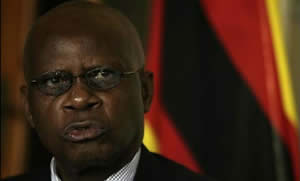Cabinet okays Human Rights Commission Bill

Parliament.
The Bill seeks to make provisions for the powers and operation of the Zimbabwe Human Rights Commission.
Justice and Legal Affairs Minister Patrick Chinamasa said the Bill was passed at the 11th meeting of Cabinet on May 3 this year.
“The Cabinet meeting approved the Bill and it has to be gazetted before it is introduced in the House of Assembly and Senate,” he said.
PATRICK CHINAMASA
If adopted, the Zimbabwe Human Rights Commission Act would empower the commission to investigate people in their individual capacities, State and corporate institutions.
Minister Chinamasa said the law would operationalise the commission and provide for the setting up of a secretariat, including its functions.
“The law would also make provisions that regulate the impartiality of the commission,” he said.
The minister however, said the commission would only carry out investigations into alleged acts of violence that occurred after February 2009.
He said the Bill would also incorporate additional functions as provided for under the constitution.
The Bill would provide for the appointment of a deputy chairperson, executive secretary and staff while providing for matters incidental to, or connected to the commission.
The commission would consist of a chairman who has been qualified for at least five years to practice as a lawyer.
The chairman would be appointed by the President after consultation with the Judicial Service Commission and the Committee on Standing Rules and Orders.
Eight other commissioners, half of them women, would be appointed by the President from a list of 16 nominees submitted by the Committee on Standing Rules and Orders.
If the chairman’s appointment is inconsistent with the Judicial Services Commission’s recommendations, the President would cause the Senate to be informed as soon as possible
Commissioners, according to the Bill, would be chosen for their knowledge of and experience in the promotion of social justice or the protection of human rights and freedoms.
Among the commission’s functions are; promoting awareness of and respect for human rights and freedoms at all levels of society; promote human rights development and freedoms while monitoring and assessing the observance of human rights in Zimbabwe.
The commission would recommend to Parliament effective measures to promote human rights and freedoms.
It would also investigate the conduct of any authority or person where it is alleged that any rights in the Declaration of Rights has been violated.
The commission would assist the responsible minister to prepare any report required to be submitted to any regional or international body constituted or appointed for the purposes of receiving such reports under any human rights convention, treaty or agreement to which Zimbabwe is a party.
It may also require any person, body, organ, agency or institution whether belonging to or employed by the State, local authority to provide annually information needed to prepare and submit required reports.
The commission would have power to take over or continue investigations instituted by the public prosecutor where it determines that the dominant question in issues involves a matter pertinent to its functions.
The commission would also refer to the public prosecutor for investigation any matter it determines that the dominant question an issue involves is pertinent to the functions of the latter.
The commission, through an Act of Parliament, would have power to conduct investigations on its own initiative or from complaints received.
It would visit and inspect prisons, detention centres, refugee camps and related facilities to ascertain conditions in which inmates are kept and make recommendations re-garding them to the minister administering the institutions.
The same would be done to places housing mentally-ill and intellectually-handicapped people who are detained and make the necessary recommendations.









Comments